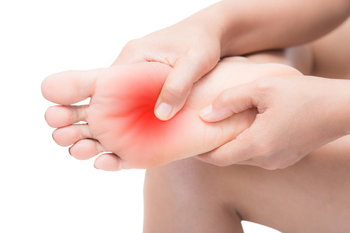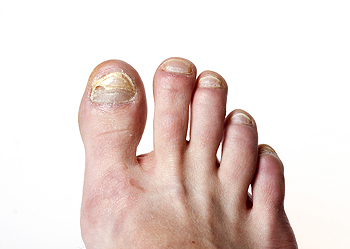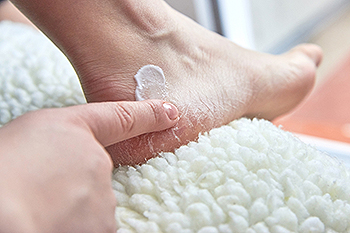Items filtered by date: January 2022
See Your Podiatrist Regularly If You Work On Your Feet
How Neuropathy Affects Feet
 Neuropathy occurs when the nerves in the hands and feet get damaged. This usually causes the extremities affected to lose their sensation and feeling, thus their ability to feel pain and temperature. Numbness, tingling, a burning/stabbing pain, and weakness are all also common signs of neuropathy. Neuropathy can have a variety of causes including inflammatory diseases, kidney problems, and vitamin deficiencies, but the most common cause is diabetes. Because of this, diabetic patients should also have regular checkups with a podiatrist to monitor the potential development of neuropathy. If you are noticing the symptoms of neuropathy in your feet, please consult with a podiatrist for a proper diagnosis and treatment method.
Neuropathy occurs when the nerves in the hands and feet get damaged. This usually causes the extremities affected to lose their sensation and feeling, thus their ability to feel pain and temperature. Numbness, tingling, a burning/stabbing pain, and weakness are all also common signs of neuropathy. Neuropathy can have a variety of causes including inflammatory diseases, kidney problems, and vitamin deficiencies, but the most common cause is diabetes. Because of this, diabetic patients should also have regular checkups with a podiatrist to monitor the potential development of neuropathy. If you are noticing the symptoms of neuropathy in your feet, please consult with a podiatrist for a proper diagnosis and treatment method.
Neuropathy
Neuropathy can be a potentially serious condition, especially if it is left undiagnosed. If you have any concerns that you may be experiencing nerve loss in your feet, consult with the foot specialists from Spartan Podiatry. Our doctors will assess your condition and provide you with quality foot and ankle treatment for neuropathy.
What Is Neuropathy?
Neuropathy is a condition that leads to damage to the nerves in the body. Peripheral neuropathy, or neuropathy that affects your peripheral nervous system, usually occurs in the feet. Neuropathy can be triggered by a number of different causes. Such causes include diabetes, infections, cancers, disorders, and toxic substances.
Symptoms of Neuropathy Include:
- Numbness
- Sensation loss
- Prickling and tingling sensations
- Throbbing, freezing, burning pains
- Muscle weakness
Those with diabetes are at serious risk due to being unable to feel an ulcer on their feet. Diabetics usually also suffer from poor blood circulation. This can lead to the wound not healing, infections occurring, and the limb may have to be amputated.
Treatment
To treat neuropathy in the foot, podiatrists will first diagnose the cause of the neuropathy. Figuring out the underlying cause of the neuropathy will allow the podiatrist to prescribe the best treatment, whether it be caused by diabetes, toxic substance exposure, infection, etc. If the nerve has not died, then it’s possible that sensation may be able to return to the foot.
Pain medication may be issued for pain. Electrical nerve stimulation can be used to stimulate nerves. If the neuropathy is caused from pressure on the nerves, then surgery may be necessary.
If you have any questions, please feel free to contact our offices located in Battle Creek, and Marshall, MI . We offer the newest diagnostic and treatment technologies for all your foot care needs.
Why Are My Toenails Yellow?
A common cause for yellow toenails is toenail fungus, however, it may be indicative of other conditions such as diabetes, psoriasis, yellow nail syndrome, lymphedema, lung problems, or jaundice. Fungal nail infections may also present symptoms such as thickened, hardened, and brittle nails, and the nail may even lift from the nail bed and emit a foul odor. Wearing shoes may cause pain or discomfort as well. This infection of the toenail (onychomycosis) is typically caused by the dermatophytes fungi in temperate climates, or non-dermatophytic moulds or candida in more tropical environments. Fungal nail infections may be brought on by exposure to the fungi that is living in public areas which are damp and warm such as communal showers, locker rooms, pools and gyms. Ill-fitting footwear, excessive sweating of the feet, brittle nails due to age, as well as injury, psoriasis, or other skin conditions may also increase a person’s risk for developing a fungal nail infection. Treating fungal nail infections is best handled by a podiatrist as the fungi are hearty and hard to kill entirely and promptly without professional care. If you have toenail fungus, make an appointment with a podiatrist. They may use prescription, oral and/or topical antifungal medications, laser therapy, as well as other treatments to help resolve your issue.
If left untreated, toenail fungus may spread to other toenails, skin, or even fingernails. If you suspect you have toenail fungus it is important to seek treatment right away. For more information about treatment, contact the foot specialists of Spartan Podiatry. Our doctors can provide the care you need to keep you pain-free and on your feet.
Symptoms
- Warped or oddly shaped nails
- Yellowish nails
- Loose/separated nail
- Buildup of bits and pieces of nail fragments under the nail
- Brittle, broken, thickened nail
Treatment
If self-care strategies and over-the-counter medications does not help your fungus, your podiatrist may give you a prescription drug instead. Even if you find relief from your toenail fungus symptoms, you may experience a repeat infection in the future.
Prevention
In order to prevent getting toenail fungus in the future, you should always make sure to wash your feet with soap and water. After washing, it is important to dry your feet thoroughly especially in between the toes. When trimming your toenails, be sure to trim straight across instead of in a rounded shape. It is crucial not to cover up discolored nails with nail polish because that will prevent your nail from being able to “breathe”.
In some cases, surgical procedure may be needed to remove the toenail fungus. Consult with your podiatrist about the best treatment options for your case of toenail fungus.
If you have any questions, please feel free to contact our offices located in Battle Creek, and Marshall, MI . We offer the newest diagnostic and treatment technologies for all your foot care needs.
Foot Pain and Discomfort During Pregnancy
Pregnancy can often bring on painful swelling in the feet and ankles as well as changes in your gait. The extra weight a woman gains during pregnancy puts pressure on their heels, ankles, and plantar fascia (the long tissue running along the bottom of the feet). This may cause pain in the heel and ankles, and plantar fasciitis (an inflammation of the plantar fascia). This additional weight may also alter a woman’s stride, causing her feet to flatten and roll inward when she walks. Swelling, or edema, is another common condition among pregnant women, and is caused by an excessive production of fluid, blood, and water retention during pregnancy. Also, relaxin is a hormone produced during pregnancy that can loosen and relax the ligaments in feet and ankles, possibly causing discomfort and instability. A podiatrist can help a woman throughout her pregnancy to relieve pain, swelling and discomfort, while helping to correct any gait or alignment issues.
Pregnant women with swollen feet can be treated with a variety of different methods that are readily available. For more information about other cures for swollen feet during pregnancy, consult with the foot specialists from Spartan Podiatry. Our doctors will attend to all of your foot and ankle needs.
What Foot Problems Can Arise During Pregnancy?
One problem that can occur is overpronation, which occurs when the arch of the foot flattens and tends to roll inward. This can cause pain and discomfort in your heels while you’re walking or even just standing up, trying to support your baby.
Another problem is edema, or swelling in the extremities. This often affects the feet during pregnancy but tends to occur in the later stages.
How Can I Keep My Feet Healthy During Pregnancy?
- Wearing orthotics can provide extra support for the feet and help distribute weight evenly
- Minimize the amount of time spent walking barefoot
- Wear shoes with good arch support
- Wear shoes that allow for good circulation to the feet
- Elevate feet if you experience swelling
- Massage your feet
- Get regular, light exercise, such as walking, to promote blood circulation to the feet
If you have any questions please feel free to contact our offices located in Battle Creek, and Marshall, MI . We offer the newest diagnostic and treatment technologies for all your foot and ankle needs.
Ways to Repair Cracked Heels
About one-fifth of adults in the United States experience cracked heels, studies show. Besides being unsightly, cracked heels that deepen can also become painful and lead to bleeding. Because there are no oil glands on the feet, they often become dried out. In addition, medical conditions such as diabetes, psoriasis and eczema can promote cracked heels. One of the simplest remedies for cracked heels is a petroleum jelly treatment. It helps reduce moisture loss from the skin and keeps it hydrated. Soak your feet in warm water for about 15 minutes, and then use a pumice stone to scrub off the dried skin. Rinse and pat dry thoroughly. Next, apply moisture lotion to the affected area and cover that with petroleum jelly to seal it in. Put on a pair of wool socks overnight and wash your feet again the next morning. If cracked heels continue to give you problems, it is suggested that you visit a podiatrist who can recommend further treatment options.
Cracked heels are unsightly and can cause further damage to your shoes and feet. If you have any concerns, contact the foot specialists from Spartan Podiatry. Our doctors can provide the care you need to keep you pain-free and on your feet.
Cracked Heels
Cracked heels appear unappealing and can make it harder for you walk around in sandals. Aside from looking unpleasant, cracked heels can also tear stockings, socks, and wear out your shoes. There are several methods to help restore a cracked heel and prevent further damage.
How Do You Get Them?
Dry skin is the number one culprit in creating cracked heels. Many athletes, walkers, joggers, and even swimmers suffer from cracked heels. Age and skin oil production play a role to getting cracked heels as well.
Promote Healing
Over the counter medicines can help, especially for those that need instant relief or who suffer from chronic dry feet.
Wear Socks – Wearing socks with medicated creams helps lock in moisture.
Moisturizers – Applying both day and night will help alleviate dryness which causes cracking.
Pumice Stones – These exfoliate and remove dead skin, which allows for smoother moisturizer application and better absorption into the skin.
Change in Diet
Eating healthy with a well-balanced diet will give the skin a fresh and radiant look. Your body responds to the kinds of food you ingest. Omega-3 fatty acids and zinc supplements can also revitalize skin tissue.
Most importantly, seek professional help if unsure how to proceed in treating cracked heels. A podiatrist will help you with any questions or information needed.
If you have any questions, please feel free to contact our offices located in Battle Creek, and Marshall, MI . We offer the newest diagnostic and treatment technologies for all your foot care needs.




